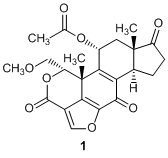PI3K Inhibitor
Autophagy is a catabolic process that digests components of the cytoplasm via lysosomes and is mediated by an organelle called the autophagosome.1,2) Autophagy is regulated by various serine/threonine protein kinases, such as mTOR, AKT, MARK etc.3) Phosphoinositide 3-kinases (PI3Ks) are also a class of such enzymes regulating autophagy. Especially, the class III PI3K promotes the formation of the autophagosome vesicle4) and a complex of the PI3K and beclin controls autophagy.5)
Wortmannin (1) is a potent PI3K inhibitor. Phosphatidylinositol 3,4,5-trisphosphate formation of fMLP-stimulated neutrophils is inhibited with a dose-responsive manner of 1 (IC50: 5 nM).6) It was shown that the treatment of rat hepatocytes with 1 inhibits autophagy with an IC50 of 30 nM.7)
It has been known that the properties of induced pluripotent stem cells (iPSCs), self-renewing and differentiation, make these cells tumorigenic.8) Zouboulis et al. reported that 1 can rapidly induce apoptosis in iPSCs.9) They discussed about apoptotic elimination of remaining undifferentiated iPSCs using 1 in their article.
mTOR: mammalian target of rapamycin
AKT: from the name of AKT8 retrovirus (J. Exp. Med. 1988, 167, 1259.)
MARK: mitogen-activated protein kinase
fMLP: N-formyl-L-methionyl-L-leucyl-L-phenylalanine
The product is for research purpose only.
References
- 1)Historical landmarks of autophagy research
- 2)Autophagy: renovation of cells and tissues
- 3)Regulation of autophagy by kinases
- 4)Two distinct Vps34 phosphatidylinositol 3-kinase complexes function in autophagy and carboxypeptidase Y sorting in Saccharomyces cerevisiae
- 5)Beclin-phosphatidylinositol 3-kinase complex functions at the trans-Golgi network
- 6)Wortmannin is a potent phosphatidylinositol 3-kinase inhibitor: the role of phosphatidylinositol 3,4,5-trisphosphate in neutrophil responses
- 7)The phosphatidylinositol 3-kinase inhibitors wortmannin and LY294002 inhibit autophagy in isolated rat hepatocytes
- 8)Variation in the safety of induced pluripotent stem cell lines
- K. Miura, Y. Okada, T. Aoi, A. Okada, K. Takahashi, K. Okita, M. Nakagawa, M. Koyanagi, K. Tanabe, M. Ohnuki, D. Ogawa, E. Ikeda, H. Okano, S. Yamanaka, Nat. Biotechnol. 2009, 27, 743.

- 9)PI3K/AKT signaling pathway is essential for survival of induced pluripotent stem cells
- A. M. Hossini, A. S. Quast, M. Plötz, K. Grauel, T. Exner, J. Küchler, H. Stachelscheid, J. Eberle, A. Rabien, E. Makrantonaki, C. C. Zouboulis, PLoS ONE 2016, 11, e0154770.

The prices are subject to change without notice. Please confirm the newest price by our online catalog before placing an order.
In addition, sales products changes with areas. Please understand that a product is not available when the product details page is not displayed.


